Lea Wait's Blog, page 8
August 13, 2025
I Rode Through The Desert On A Horse With A Name (But I forget what it was)
John Clark making up for last week. Those of you who are regular MCW readers might remember that we took our oldest granddaughter, Piper, on a Road Scholar trip to Chincoteague in Virginia last summer. We all enjoyed that so much, we decided to go on a different trip through the same organization this summer. I want to give my wife, Beth full credit for doing a thorough and careful job of planning everything.

This time, we went to White Stallion Ranch just outside Tucson, AZ. I must say that I had some reservations about spending a week where temperatures would be over 100 degrees. We flew from Portland to Atlanta, then to Tucson where we spent a night in a hotel. The ranch picked us up in a van early the next day and we were off on our week of ranching adventures.
Piper, now eleven, has her own pony, but riding on desert trails is a whole different experience. It was rewarding to watch her blossom, gain confidence, and bond with two girls, one from Virginia, the other from Washington State. They were inseparable all week, whether in the pool, on horseback, or at the indoor activities.

Each day started with an opportunity to help groom horses (Beth and Piper took advantage, I did not), followed by a hearty breakfast. All our meals were plentiful and tasty. I particularly liked having an abundance of fresh fruit for each meal. Activities were varied and took into consideration the heat, with riding and other outdoor stuff early in the day or late in the afternoon.

Oh Ra, Oh Ra, is that your horse?
I had not planned on getting on a horse, having never done so, but changed my mind. I ended up on three slow trail rides, one of them when the temperature hit 110 degrees. All three were a pretty comfortable experience, although I suspect they assigned me horses with molasses instead of blood as they consistently lagged the others.
Piper took advantage of daily lessons on horsemanship, then passed a test so she could go on a couple fast trail rides. It was most satisfying to see her comfort level and confidence level grow daily. She and her new friends enjoyed a couple team events, cattle sorting and team penning (four riders rounding up and moving three steers into an adjacent pen.
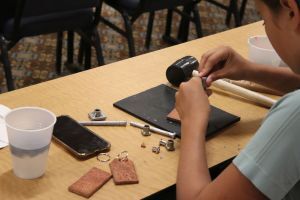
The start of a leather keychain
In addition, there were hands on classes in acrylic and watercolor painting, as well as leatherwork. I enjoyed letting my inner creative persona loose for all three.

Can you guess who painted what?
We also had the following activities to enjoy. There was a trip to the Arizona-Sonora Desert Museum, a place I went to fifty years ago. It’s larger and has a lot more exhibits now, well worth visiting if you’re in the area.

We had a couple other afternoon sessions of note. Doris Evans, a docent at the desert museum, has been filming wildlife coming to her back yard on the outskirts of Tucson for years. She keeps a water basin filled, as well as varied snacks like cut up oranges for visitors. She showed us some of them from owls and lizards, to javelinas and coyotes.
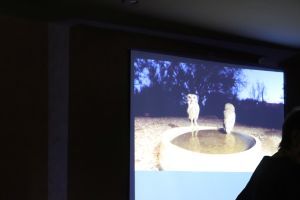
Great Horned Owl dancing
Diego Dunn, who graduated from Arizona State a year after I did, developed a nice side gig after a career in aerospace engineering. He packages and sells edible items made from, desert plants. They include a great syrup made from prickly Pear, as well as candy and lip balm from the same plant. I chatted extensively with him both during the presentation and at social hour afterward.
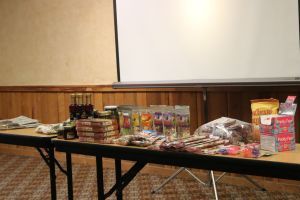
Some of Diego’s products
Phil Garcia is the Arizona equivalent of Maine’s Mr. Drew. Both have a dedication to care for injured critters as well as enjoying exhibiting them in a way that decreases peoples’ irrational fears. He brought an array of snakes, lizards, a tarantula, a scorpion, a desert tortoise, and a chinchilla. Everyone got a chance to hold and/or pet them.
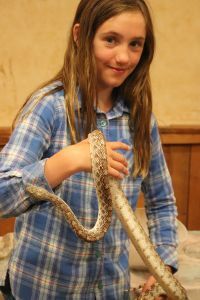
I took advantage of target shooting, hitting on 26 of 27 shots between a lever action rifle and a revolver.
Each evening we had a chance to enjoy a different activity. Line dancing, star watching, rope tricks, and an old fashioned cowboy sing-along around a campfire were the ones that happened while we were there.

When our stay was over on Friday, we were dropped off at the airport where we picked up a rental car and headed for Tempe where I went to college. I hadn’t visited since 1975, but have kept up with changes and developments through the alumni magazine. It now has multiple campuses with 100,000 students enrolled. ASU is consistently ranked in the top three in innovation and research, ahead of such schools as Harvard, MIT, and Stanford.
I had a bit of a nostalgic sense as we strolled down the main area that was a roadway during my first year there in 1966. It is very nicely landscaped and even has a wild parrot population. Hayden Library now stretches under the pedestrian area and has a sunken garden two floors below where we walked. Three new skyscrapers are in the process of being built north of the main campus area and the number of buildings housing programs that weren’t even thought of in my undergraduate days is impressive.
We had a great meal at a Palestinian deli. The beef was perhaps the best I’ve ever had, and I got a kick out of reading that the Palestine Cola I drank was made in Sweden.
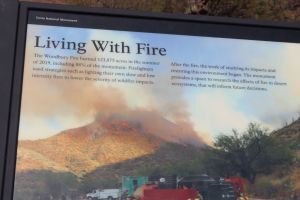
On our last day, we headed east so I could show Beth and Piper Roosevelt Lake and some of the Pueblo ruins nearby. The heat made hiking up to the ruins impossible, but we were able to see them through a viewer at a pullout. The scars of a fire that burned 80% of the area in 2019 are most apparent when driving south from Globe. The east side of the road is lush with greenery, the west, little more than dead trees and stunted cacti. The temp. reached 117 as we headed back to Tucson
Dinner with my best friend from ASU, the illustrious M. Thomas Carollo, was last on our list. We’ve remained friends through a lot of stuff I dare not go into, and I was thrilled when I learned he was moving from Arlington Texas to Green Valley, AZ just before our trip.

The stories we could tell!
I suspect we’ll go on another Road Scholar adventure in 2026, bodies willing.

No, he can’t whistle
August 11, 2025
WHAT IS SEO?
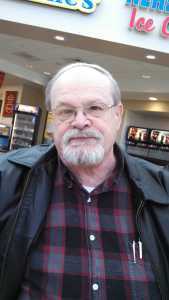
Vaughn C. Hardacker
Recently, I contracted with Melissa Gerety of MCG Creative in Orono to develop a new webpage for me (https://www.vaughnhardacker.com). I had another firm do my old one (I won’t mention their name), but was not only dissatisfied with their work, but I became irritated by their incessant attempts to sell me stuff and services that I had no use for. I met Melissa at the Bangor Author’s Book Fair & Literary Festival (https://bangorpubliclibrary.org/programs-and-events/bangor-area-maine-authors-book-fair-literary-festival/), where I shared a table with one of her clients. What has developed is possibly the best working relationship I’ve ever had with a website developer (hint: she has also been acting as a publicist and gotten me on WABI television and booked me into several appearances in southern Maine (which means everything below Caribou–or, as I call it, the United States). Now that the site is live, it’s time for me to get serious. I don’t have to tell most writers that we love the writing, but (most of us) hate the actual work in our business, to wit, SALES and PROMOTION. The first thing Melissa told me was that she does not create sites with WordPress; she uses WIX (As I go on, I will reveal why I believe she made the correct decision).
What is SEO?
Search Engine Optimization ( henceforth known as SEO) is a strategy to help your website rise to the top of the search engine results pages on Google, Bing, and other search engines. Currently, the worldwide market share of the most popular search engines is: Google – 89.57%, Bing – 4.02%, Yandex – 2.19%, Yahoo – 1.49%, DuckDuckGo – 0.95%, and Baidu – 0.72%. You don’t have to be a statistician to see why the name Google has become a standard descriptor for doing a search. How often have we said: I’ll Google it,” or something along those lines? The tactics set forth in this first of several blogs on SEO will concentrate on Google. (Spoiler Alert) SEO is a lot of work, and it must be done for a while before you will see meaningful changes to your search ranking. Note: SEO brings in Organic Search Traffic. Organic Search traffic is the result of free traffic, not paid advertising.
CORE ELEMENTS OF SEO.
On-Page SEO
On-Page deals with all the activities you perform on your website and its pages to increase its ranking on the Search Engine Results Page (hereafter called SERP). This involves regularly writing high-quality (updating) content, incorporating good keywords into the content, as well as ensuring your meta and title tags are also keyword-rich and are well written. It is for this reason that unless you are an experienced web designer, it is best to have your site developed by a professional, experienced designer.
Off-Page SEO
Optimization of your website’s pages, such as building links back to your site from other websites, social media platforms, etc. In short, your ability to build relationships that will allow you to gain those links and post high-quality content that others will want to share with their followers.
BLACK HAT SEO vs WHITE HAT SEO
Black Hat SEO is when someone circumvents Google’s requirements in order to rank a website. AKA hit-and-run for quick gains and then on to some other thing in the shortest possible time. It’s kind of a used car salesman strategy in which link scraping and keyword stuffing content and pages. This will allow them to rank higher and faster than other websites. It may work for a short time. However, the folks at Google are getting smarter daily; if caught, their websites end up being penalized and de-ranked on the SERPs. Moral of the story? Play by Google’s rules. It takes longer, but the results will pay off in the long term and build a long-lasting business.
Black Hat Strategies:
Duplicate Content, invisible text and stuffed keywords, cloaking or redirectingthe user to another site or page, and links to non-related content
White Hat Strategies:
Relevant content, well-labeled images, relevant links and references, complete sentences with correct spelling and good grammar, standard-compliant HTML, and unique and relevant title pages.
How To Avoid Black Hat SEO
Keyword Research and Selection: The main way Google understands what your site is about and serves your site accordingly. There are tools like Ubersuggest to help find keywords that will help your rank on Google. Make sure you don’t force them into a role where they don’t belong. Creating quality content is most important above all else.
HTML: title tags, meta descriptions, alt texts, and headers are crucial elements of SEO that apply to your on-page SEO. These help tell Google about your content and what readers can expect from your site.
Site Architecture: deals with how your site was coded and built. This is about the design and functionality of your entire site. Is navigation through your site easy? What is your site’s speed? (Nothing will make a visitor leave any faster than a slow site.) Does your site comply with Google guidelines? Google wants its customers to have the best experience, so make your site such that people who land on it will be happy with what they see.
Trust: Crucial if you are selling books on your site. Features like SSL certificates and HTTPS are now the industry standard. Google expects this from all websites to rank.
Links (off-page SEO): Part of showing legitimacy to Google is a vote of confidence from other sites by linking to your pages. It is best if you build your links manually and not use a program that promises millions of links in two days, as this ensures the relevance of your links.
Personal” Fulfill the needs of your customers once they land on your page. Google sees how long a visitor stays on a page.
Social: Social media platforms are crucial. They work hand-in-hand with SEO and show Google that you’re in it for the long-term and willing to do whatever it takes.
EAT (Expertise, Authority, Trustworthiness): Your content should reflect your dedication to sourcing quality information on the topic. Your content should help you build your reputation and earn the trust of your customers. (Kind of like telling a literary agent why you wrote the book in a query letter.)
SEO and Google Algorithm Updates: An algorithm is a series of operations a search engine uses to calculate and rank websites based on the relevance of a search query. The purpose of algorithms is to weed out those people using Black Hat SEO.
Still with me? I know that this is a lengthy blog. You are also saying: “I don’t design my site, so why should I care about this?” There are thousands (or millions) of people in the world who want to sell you something and are looking to take advantage of you. I have always said: If there is anything more important than knowing what you know, it is knowing what you don’t know–and knowing where to get the answers. If you are thinking of designing a website for your writing, or hiring someone to do it for you, wouldn’t it help to know what questions to ask?
In my next blog, I’ll discuss how search engines work.
End Of Summer Thoughts
It’s August, and though the days are warm and muggy, the end of summer looms. Mornings bring with it the breath of autumn. Despite loving the fall, I always get a little sad this time of year. Summers in Maine go so fast. Time is running out to go to the beach, eat fried clams, throw a clambake, chow down on lobster, play golf, enjoy an ice cold beer on the deck wearing only shorts and sandals while watching the Red Sox. Ahhhh, the ideal summer. Enjoy them while they last.
Speaking of the Red Sox, they’re playing great baseball lately, especially after trading Rafael Devers. I’m an avid fan and watch them religiously. The promotion and success of phenom Roman Anthony has made them even more compelling. And if course Garret Crochet, the best pitcher in baseball. Go Sox!
My good friend and writing group partner, Tim Queeney, has a fantastic new book coming out this week called ROPE. It’s about the history of rope and it’s a great read.
My other friend and writing group partner, Julie Selbo, has a play premiering in California called Mary Shelley: Year Without A Summer. It’s showing at the Ojai Performing Arts Theater. Check it out if you’re out there, My peeps are doing pretty well.
Oh, and I went out to Los Angeles a few weeks ago. My son is trying to make in the entertainment/sports industry. What a city! Traffic is crazy. Koreatown is massive and quite a sight. I went to German brewery that served Korean food and was fantastic. Went to a Dodgers Game and loved that stadium. Did you know that after Boston and Wrigley it’s the third oldest park in baseball? If you’re a baseball fan, you must go there. Get a Dodger Dog with extra mustard and tell Mookie and Shohei I sent you.
I’ve written much about AI in these posts. While out in LA I experienced these new Waymo cars. They’re like Ubers, except their self-driving. They market themselves as “The world’s first autonomous ride-hailing service.” And they’re all over the city. It’s another version of AI taking over the world by storm. In less than a decade, I don’t think they’ll be any human taxi or Uber drivers.
I finished all the edits on my new book. Whew! What a relief. It’s getting harder and harder as I get older. The new novel is called Cruel To Be Kind, Book 2, and it is a follow-up to Cruel & Bitter Things. Gwynn is stuck in a bad marriage while a copycat killer roams the street of Portland.
I’m enjoying summer now in the hills of New Hampshire. Gorgeous here. Hot but gorgeous. Having a beer and reading a book.
That’s all I got for now. Hope you enjoy the rest of the summer. And as Matt Cost says, “Write on!”
August 8, 2025
Weekend Update: August 9-10, 2025
 Next week at Maine Crime Writers there will be posts by Joe Souza (Monday), Vaughn Hardacker (Tuesday), Gabi Stiteler (Thursday), and Rob Kelley (Friday).
Next week at Maine Crime Writers there will be posts by Joe Souza (Monday), Vaughn Hardacker (Tuesday), Gabi Stiteler (Thursday), and Rob Kelley (Friday).
In the news department, here’s what’s happening with some of us who blog regularly at Maine Crime Writers:
Matt Cost has the 6th and final TRAP book coming out this week. Wednesday, August 13th, will see the birth of GLOW TRAP. Pre-order it HERE.
What happens when a spy, a retired thief, and a person in the witness relocation program end up in the same coastal Maine town? Nothing… until a man using an alias washes up on shore and threatens to tear the idyllic nature of Port Essex apart at the seams. Baker & Wolfe are pulled in when Peter Angel claims that his brother was deathly afraid of the water and would not have voluntarily been out on a boat, leading to his accidental drowning.
Who was the dead man really? When Baylee is driven off a cliff at the same exact spot that Clay’s father, mother, and grandmother died in a horrific car accident, the past becomes entwined with the present in a twisted web of lies. And then Niles Harrington, a name from the past, is set free.
Is it possible that the dead man, Clay’s parents’ accident, and Niles Harrington are all connected? Clay Wolfe, Baylee Baker, the gang, and Port Essex become embroiled in their hottest and deadliest mystery yet. Will the spies, informants, and thieves be exposed in time before the killers can finish the job that they have begun?
Recently, COST had an interview on WABI TV5, talking about his recently released THE NOT SO MERRY ADVENTURES OF MAX CREED. It is short and to the point. Check it out HERE.
An invitation to readers of this blog: Do you have news relating to Maine, Crime, or Writing? We’d love to hear from you. Just comment below to share.
And a reminder: If your library, school, or organization is looking for a speaker, we are often available to talk about the writing process, research, where we get our ideas, and other mysteries of the business, along with the very popular “Making a Mystery” with audience participation, and “Casting Call: How We Staff Our Mysteries.” We also do programs on Zoom. Contact Kate Flora
CALIFORNIA AND FRANKENSTEIN
Jule Selbo
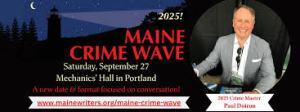
Maine Crime Wave! September 26, Friday – NOIR AT THE BAR at Novel Bookstore at 643 Congress in Portland – Evening readings by New England Mystery writers! Come for fun and prizes! All day Saturday, on September 27, the annual Crime Wave Conference, full of roundtable/interactive workshop opportunities, will be at Mechanics Hall at 519 Congress Street. If you’re a writer or a reader or just someone who likes an “excellent” experience – come join us!
So the above is a bit more than a month out and right now, it seems a long way from where I am right now (mind and body) and I am thinking about MONSTERS.
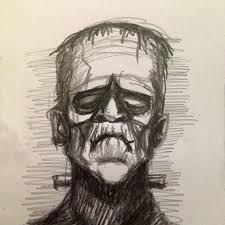 I’m in hot (95 degrees plus), dry (humidity? never heard of it) Los Angeles about to drive in my Turo-rented car (no more Hertz, Avis, Budget, Enterprise et al for me, I only rent from my fellow entrepreneurs). Aren’t we writers all entrepeneurs?
I’m in hot (95 degrees plus), dry (humidity? never heard of it) Los Angeles about to drive in my Turo-rented car (no more Hertz, Avis, Budget, Enterprise et al for me, I only rent from my fellow entrepreneurs). Aren’t we writers all entrepeneurs?
Turo is BIG in LA because to live here (which I used to do) without a car is a near-sure commitment to isolation and since UBER prices are absurd (a four mile trip = $40.00 (and don’t even get me started on SURGE pricing)). The guy I’m renting from today has his own stable of ten cars that he rents out for the day/week/month. Super clean, well-maintained and for nearly half the price of H, A, B, E et al and even better than Rent a Wreck). How does he afford to have all those cars? Did he lease them all? Bought them? Who knows because I never meet him. He left me the car at the Panda Express by the Burbank airport, he unlocked it for me REMOTELY and – off I went. The ways people are making money these days and how we work so hard to NEVER have to interact personally – very very very interesting.
[image error]

What kind of car am I driving? A 2025 KIA. Spotless. 12,345 miles on it.
Anyway, no more up-selling of my life choices. I’m driving an hour and forty-five minutes north to Ojai, CA – a picturesque California “village” full of stucco/pueblo style shops, with shady arches, fragrant smells of tamales and wine and farmers’ markets.

Homes in the small main town area are either Craftsman bungalows – or the “Pueblo Revival” style – thick-walled to keep the temperatures inside sort of constant. Artists, musicians, writers, dancers, teachers, farmers, horse trainers and horse riders, farmworkers, ranchers, ranch-hands, Hollywood celebrities (their second homes), massage therapists, retirees, barflys, people who formed in the 70s and stopped there and still cherish their tie-dye looks, really smart people who used to work in D.C., crystal gurus and other creatives thrive here. Grocery stores are full of locally-grown produce, wine stores feature local libations, clothing stores sell local hand-woven garments, coffeehouses and bakeries have treats that can send your tastebuds to Nirvana.
Sure, Ojai is in a worrisome pocket, surrounded by dry bush hills and dry, parched land with scrub trees that can be quite flammable. The Thomas fire in 2017 burned nearly 300,000 acres and evacuations were high. They tell me that fire was caused by power lines getting too hot in high, scorching winds. Every year there is another threat (that sometimes becomes a reality) and even today there’s a fire alert for an area 5o miles north of Ojai.

Why am I driving in my Turo car to Ojai? It has three well-respected ‘legit’ theaters and a famous summer theatre festival. I got a call in January –one of those theatres – this one called Ojai Performing Art Center (OPAT), wanted to produce my play MARY SHELLEY – YEAR WITH NO SUMMER. It’s a call playwrights hope for – it’s hard to get a play produced these days if there are more than two characters and if the production calls for anything other than lights up and lights down. My play has six characters (yes, including the MONSTER – the CREATURE that we all know from Mary Shelley’s Frankenstein) and I wanted the production to include lightning, thunder, electrical “fireworks”, flying ghosts and more.

What I wanted to explore was Mary Shelley’s troubled youth, her teenage years (she wrote Frankenstein, The Modern Prometheus when she was 17-18), her guilt of running off with a married Percy Shelley (his wife, Harriet, was very delicate, mentally and physically), Mary’s desire for respect as a woman and as a female writer and her fascination with science, particularly the work of scientists like Luigi Galvani and Alessandro Volta. Most of all I got interested in exploring the idea of the CHOICES we make in our lives and how to accept the CONSEQUENCES that these choices create. Mary is struggling with her life’s choices (so far) and building the character of the Creature only exacerbated her delicate state of mind at the time famous Lord Byron challenged her to write a horror story. It was 1816, during the YEAR OF NO SUMMER in Europe, caused by the 1815 eruption of the volcano Mount Tambora in Indonesia. Nearly half the world was in darkness (ash being heavy in the skies and moving in the winds etc). for almost a year.
The play opens Friday, August 8th and I’m driving from Los Angeles to Ojai to see it.

Fingers crossed, of course. Handing over “your creation” to a director and actors and a lighting designer and a costumer and et al – all you can do is hope that they “got” the play as you intended (hoped) it would be “got” when you wrote FADE OUT. I’ll be walking into the theatre blind – I don’t know the actors or crew that are going to bring my play to reality “on the boards”. It’s like I gave it up for adoption and now I am checking in on the fully-grown child who has been nurtured by others.
Wish me luck! I hope to see EVERYONE in the New England mystery writers conclave in September ( MAINE CRIME WAVE, Friday night and all day Saturday) – and I’ll let you know how the play went – unless the CREATURE takes me, leads me, grabs me… and I end up in his tower – captive – forever. (As I believe Mary Shelley’s mind ended up in her Creature’s hold – for the rest of her troubled life).
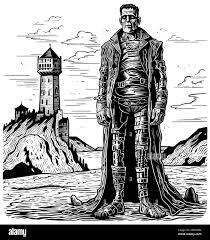
August 7, 2025
Dear Writer, Never Mind What Mother Told You
So today is John Clark’s day to blog, but he’s in boiling hot Arizona, on a ranch. Last I heard, he was horseback riding. So this is an oldie but a goodie from me.
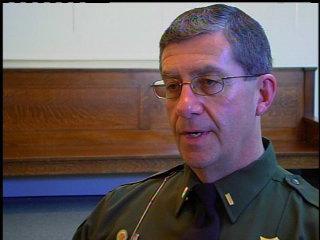
Maine Warden Lt. Pat Dorian, who talks faster than anyone I’ve ever met.
It’s Kate, and I’m talking today about teaching.
A writer has to listen. That’s what I tell my writing students. As they sit there around the table, pens poised for the wisdom that a 28-year writer (now it’s been since 1984, so a very long time) might have to impart, I give them some shocking advice. Never mind what your mother told you about minding your own business, I tell them, being a writer is a license to be nosy. Okay, we might get more polite and say a license to be curious–but you know what I’m saying. I’m saying that if you want to be able to craft credible, nuanced, life-like characters in your books, you have to start paying attention to the world around you. I even sometimes print out and give them that license.
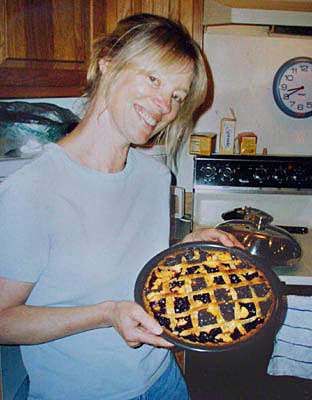
In my skinnier days with a Maine blueberry pie
I’ve taught in Maine, Massachusetts, New Hampshire, Vermont. In Florida and Nebraska and California. I’ve taught in church basements and art studios with paint smeared tables, in gorgeous conference rooms and the back rooms of bookstores. I’ve taught in air-conditioned classrooms and in facilities that were so overbooked I had to fight for my classroom and my desks and chairs every week. Most of the time, I taught for Grub Street in and around Boston, although I’ve also done webinars for Sisters in Crime and a powerpoint at the New England Crime Bake. Wherever I’ve taught, one thing I will always tell my students is how important it is to be curious and observant about the world around them. Often I give out tiny notebooks, and for courses that meet weekly, one of the assignments my students will have, along with their weekly writing assignments, is to listen to conversations, observe other people, and pay attention to what they’re reading so they notice what’s striking or inspires an idea of their own, and to come in the following week with discoveries to share with the rest of us.
Most of the time, they do what they’re told. Sometimes a student will come in and report that she didn’t see anything. Usually, that means she’s been tuned into a a phone and tuning out the world. Sometimes it’s because he didn’t see anything that seemed interesting, a view that quickly changes as the other students start reading from their notes, and the amazingness of the quotidian begins to unfold.
[image error]Fill your pen with ink, and your ears with stories.
To get them thinking about what’s out there, I sometimes start with a story or two of my own. For example, one night, on my way to that overbooked classroom in Harvard Square, I was waiting at a light to cross the street. In the clot of traffic that was moving through the light, there was an old wreck of a car, rust-blistered and traffic dinged, windows down on that hot night. The driver wore a wife-beater and dreadlocks, and as the car passed, an aria from an opera drifted out the window. Hot on it’s tailpipe came a Mercedes, with an impeccably dressed late-middle-aged WASPy couple perched on glove leather seats. Those windows were also down, and from inside the car came the teeth-rattling sound of rap music turned up high. The small Asian woman next to me and I exchanged glances, shook our heads, and crossed the street. If I’d been plugged in, or lost in thought, I would have missed it.

Camden Library serves finger cookies.
One summer weekend, sitting at the table after blueberry pancakes with some guests, I mentioned that I’ve been toying with the idea of writing an incantation, or writer’s prayer, to use to begin tough sessions. Another writer sitting at the table intoned, “Oh, Lord, please help me still my inner critic long enough to create a shitty first draft (those last three words being a quote from Anne Lamott’s book, Bird by Bird). Later in the conversation, a mother was describing her son mastering balance on his bike. As he whizzed past her, he yelled, “Mom, I am the boss of right now!” I will cherish those words, share them with others, and try to be the “boss of right now” more often. But what if I hadn’t been listening?
Another reason I give them for being curious about the people around them is that at some point, most of them will be writing dialogue, and not everyone speaks alike. Start with your family and friends, I’ll say, and make them your laboratory. Notice the differences in how men and women speak. The generational differences. If your family and friends come from different parts of the country, or from different countries, how has that influenced the way they speak? Then I urge them to carry that noticing out into the workplace, into the broader community, and begin to pay closer attention to people’s word choices, speech rhythms, to how directly or indirectly they convey information.
Before I give them their challenging writing assignment–to write a quarrel between two or more people, getting the identity, the voices, and the attitudes of your different speakers only through their words, without using any tags (not even he said, she said) or business–I tell them this story:
When she was in her late seventies, my mother, A. Carman Clark, who was a newspaper columnist and country living writer, stopped into the Vose Library in Union, Maine, looking for a mystery to read. After pulling several off the shelf to feed her voracious habit and reading the cover matter, she complained to the librarian that she was frustrated by her inability to find a mystery to read that wasn’t either too bloody or one that didn’t feature people who lived improbably grand lifestyles. She wanted a mystery that a gore-averse country mouse could enjoy.
“Mrs. Clark,” the librarian responded, “if you don’t like what we have to offer here, why don’t you go home
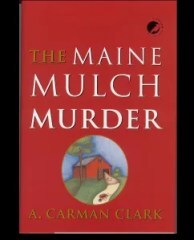
The Maine Mulch Murder by A. Carman Clark
and write one?” So write one she did.
And when she gave the draft to some of her writer friends among the Maine Media Women, the response she got was this: We like your characters. We like your setting. We like your plot. But we find it hard to believe that all the residents in this small Maine town talk like seventh grade English teachers. (Which is what she had been for many years.) She realized then that she needed to pay closer attention to the people around her, so she could write a better mystery. She started listening to the people around her, and taking note of how they spoke. The Maine Mulch Murder was published when she was 83.
Sometimes people will say they don’t know where to listen without seeming nosy, and I have two suggestions. The dressing rooms at someplace like T.J. Maxx, where you can hear so much without the faces being a distraction. The mother not listening to her daughter. The two friends joking about whether they would dare to wear something. The woman on the phone spilling the entire sordid story of her divorce. It’s all there for the taking. And for guys, since they’re less likely to be in dressing rooms where people are chatting, there is Dunkin Donuts at 10:30 in the morning, when the workmen come in for coffee. Just sit at a table, pretending to be staring at a screen, and listen. And they will give you stories.
August 5, 2025
A Maritime Research Center in a Boat Building Hub
As longtime readers of the blog know, one of my favorite of Maine’s outstanding public libraries is Friend Memorial Public Library in Brooklin. We happen to be enjoying our annual sojourn in Brooklin, which inspires me to build upon the July 22 post of my blogmate, Matt Cost, “Libraries Make the Reading World Go Round” in which he captured so well the value of Maine libraries.

Friend Memorial Public Library, Brooklin, Maine
A library reflects its community, so it’s no wonder that in tiny Brooklin, population 829, Friend Memorial would take on the ambitious work of launching a $2.5 million capital campaign to expand the library and support the establishment of a maritime research center.
The MRC, to be located in the new addition, will hold an expansive book collection donated by Jon Wilson, founder of WoodenBoat magazine and later the WoodenBoat school. He amassed 6,700 volumes, many rare and irreplaceable, in the areas of boat building and repair, design, engines, fisheries, navigation and piloting, rigging and sails, maritime and yachting history, and a wide range of other topics. The collection also contains runs of other periodicals from early in the 20th century and vertical file drawers of technical information, clippings, and design pages. If you’re into All Things Wooden Boats, this promises to be the veritable library of Constantinople.
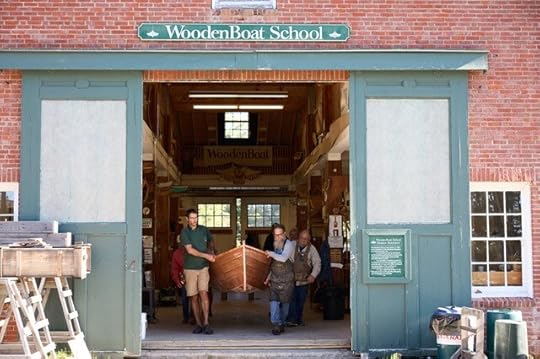
Students moving a finished boat, Credit: WoodenBoat School.
The Anne and Maynard Bray Maritime Research center collection also will include 155,000 images from renowned maritime photographer Benjamin Mendlowitz, who has donated slides of his work from the years 1979 through 2005.
The center takes its name from Maynard Bray, 91, a historian of American shipbuilding and the author of many books about wooden boats, including the classic Book of Wooden Boats. His late wife, Anne Bray, also brought considerable knowledge to the field of wooden boats as the librarian of Jon Wilson’s collection housed at WoodenBoat School. You might be interested in this 2024 conversation between Jon Wilson, Maynard Bray and Steve White, recently retired president of Brooklin Boat Yard. Be sure to click on the link at the bottom of part one to get to part two:
The impressive undertaking of a maritime research center reflects the Friend’s commitment to the distinct community and history of the town, as public libraries tend to do. Friend has long enjoyed the generosity of many benefactors, notably including Katherine White and E.B. White, and its programming exquisitely represents a deep investment in local readers and artists of all ages.
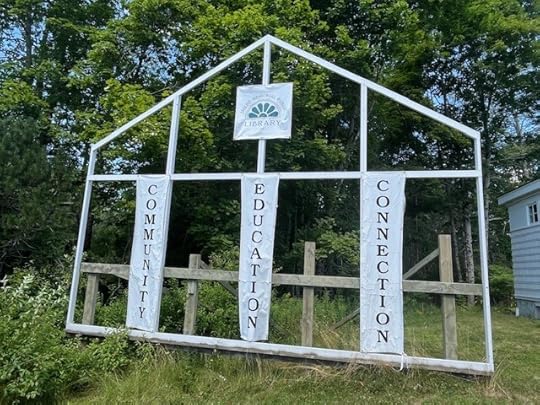
The new addition will be built on the south side of the current library, which was built more than a century ago.
Brooklin is proud to call itself the Boatbuilding Capital of the World. In keeping with the tradition, its small but mighty library soon will have a world-class maritime and boat-building collection for all to use and love. Just one more example of a public library doing what libraries do best: Preserving access to a precious body of knowledge for everyone and for the future.
Brenda Buchanan sets her novels in and around Portland. Her three-book Joe Gale series features a contemporary newspaper reporter with old-school style who covers the courts and crime beat at the fictional Portland Daily Chronicle. Brenda’s short story, “Means, Motive, and Opportunity,” was in the anthology Bloodroot: Best New England Crime Stories 2021 and received an honorable mention in Best American Mystery and Suspense 2022. Her story Assumptions Can Get You Killed appears in Wolfsbane: Best New England Crime Stories 2023. She’s now busy with new projects.
August 4, 2025
The Body in the Blueberry Barrens
 From time to time, we share news about new books by Maine crime writers. Today, news of Claire Ackroyd’s newest.
From time to time, we share news about new books by Maine crime writers. Today, news of Claire Ackroyd’s newest.
Claire Ackroyd: I was raised on murder mysteries in England – fed every new Agatha Christie by my grandmother as she read them, and have ever since believed that every good story needs a dead body in it.
I think I always supposed I could write a book, and all I needed was space in my head, and time, which would come one day when life slowed down. It turned out that even as I hit 70, those commodities were as scarce as ever and what I really needed was courage and a good kick in the pants.
Courage came from reading ‘Bird by Bird’ by Anne Lamott, and Stephen King’s ‘On Writing’. The message I took away, whether or not that was what they intended, was to stop worrying and get started. Fingers on keyboard. Start typing. The needed kick was delivered by a good friend who demanded that I stop whining and go on a writers retreat – a whole new concept to me. With the fear that if I didn’t get moving I would age out of the ability to string thoughts together, I signed up for a week at The Writers Colony at Dairy Hollow in Eureka Springs, Arkansas and when I left I had half a story written and a clear path to its conclusion.
‘Murder in the Maple Woods’ was born from an urge to present a picture of life in the distant maple sugar camps that lie along Maine’s northwest boundary with Quebec. I had come to know this remote and interesting world as an organic certification inspector – work that has taken me into these woods in sugaring season, and a murder mystery was my natural go-to context for a story.
The mysteries I loved best combined a good plot with a look into a world I did not know. Dorothy Sayers ‘The Nine Tailors’ has lived in my mind for most of my life. In it, Lord Peter Wimsey’s knowledge of the arcane world of change ringing – the peculiar business of ringing church bells in impossibly complicated mathematical sequences – provides the answer to how a man died. For years I contemplated using the minutiae of the Linnaean binomial nomenclature system to reveal clues to a mysterious death, but the organic certification process for maple syrup presented a better option and as I slogged through cold and exhausting days in the woods a mystery novel began to take shape.
Apart from Stephen King and Anne Lamott, I avoided all other advice. Manuals on style and technique seemed to want to tell me things I had learned decades ago from Strunk and White’s ‘The Elements of Style’, and joining writers groups only confused me. In the peace of my nook at The Writers Colony I focused on finding the story and the style that felt right to me, under the ever-watchful eye of Polonius, who repeated his advice to Laertes; ‘To thine own self be true. Thou canst not then be false to any man.’
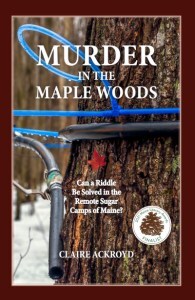 I needed a plot and a puzzle to solve but most of all I wanted characters and a setting that were authentic and respectful. Permission to avoid nail-biting suspense and complicated, unrealistic plot twists came from hearing an interview with Taylor Sheridan – creator of the movie ‘Wind River’. He said his goal was to expose the crisis of missing and exploited women on the Wind River Reservation. His plot, he said, was simple and easily deciphered and he would rely on character and setting to tell his story. I figured if he could do it, so could I.
I needed a plot and a puzzle to solve but most of all I wanted characters and a setting that were authentic and respectful. Permission to avoid nail-biting suspense and complicated, unrealistic plot twists came from hearing an interview with Taylor Sheridan – creator of the movie ‘Wind River’. He said his goal was to expose the crisis of missing and exploited women on the Wind River Reservation. His plot, he said, was simple and easily deciphered and he would rely on character and setting to tell his story. I figured if he could do it, so could I.
I found I was learning universal truths as I wrote; that first drafts are made to be revised, that ‘writers block’ can be overcome by just writing something, and that long walks are an amazing aid to creative thinking. As characters took shape they took over, and I became their medium, faithfully channeling and recording their thoughts and actions, despite their occasional use of profanities in two languages. I have a dread of getting important facts wrong and I did ‘research’ – picking the brains of good friends and total strangers for input on essential details. All these, I learned, are standard operating procedures for writers but were revelatory to me. It was part of the process of becoming something I had only imagined – the author of a published book.
This led to an un-anticipated problem. No sooner had ‘Murder in the Maple Woods’ hit the shelves than there were demands for a sequel. My ego and my reluctance to let go of this new part of my life persuaded me that I could do it all again. Wild Maine blueberries – as iconic and interesting as Maine maple syrup – were out there inviting a story, but this time it was different. The first book sprung from the idea of a story. The second one was prompted by the need to come up with a plot in order to make a book, and it was much harder work. I dutifully set my characters down in the blueberry barrens of Washington County but they were as unenthusiastic about the project as I was. I found myself forcing actions onto them that seemed unnatural and demanded endless explanation.
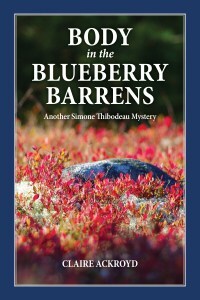 Nonetheless I persisted and generated a bulky manuscript that, to my horror, prompted lukewarm reactions from two trusted readers. I suddenly understood why I had so disliked what I had written. It was clunky and the tedious expository filler buried my characters and weighed down the action. I pulled the thing from its projected publishing date and went back in with pruning tools, deleting over seven thousand words from a seventy-thousand word monster. Freed of their burdens my characters and the story came back to life and six months later ‘The Body in the Blueberry Barrens’ was a book that I no longer hated.
Nonetheless I persisted and generated a bulky manuscript that, to my horror, prompted lukewarm reactions from two trusted readers. I suddenly understood why I had so disliked what I had written. It was clunky and the tedious expository filler buried my characters and weighed down the action. I pulled the thing from its projected publishing date and went back in with pruning tools, deleting over seven thousand words from a seventy-thousand word monster. Freed of their burdens my characters and the story came back to life and six months later ‘The Body in the Blueberry Barrens’ was a book that I no longer hated.
My evolution from story-teller in the bar to published author still feels miraculous. I think of Harold and his Purple Crayon, creating his own world and the solutions to problems he sets for himself. If I wanted to take on issues that annoy me – like the prejudice against pit bulls or the belief that maple syrup making is some quaint cottage industry – all I need is my key board and a beverage. I had no idea how much fun this would be. I have met and made friends with all manner of people I never would have known – from law enforcement officers to fellow authors and tons of appreciative readers. Whatever comes next, this has already been a wonderful late chapter in my life.
Claire Ackroyd is a landscape designer and an independent organic certification inspector. She grew up in post-war England and came to the US as a graduate student. She has lived in Orono since finding her way to Maine in 1976. Her career as a horticulturist has included owning and operating her own Landscape/Garden Center business (The Growing Concern, in Orono), teaching, consulting and freelance landscape design.
Working for many years for MOFGA led her to inspections in the sugar camps in the remote woods above Jackman and the blueberry fields of Washington County. She felt that the unique, and little-understood lives of the producers of these iconic Maine crops deserved authentic portrayals, providing the material for her long-delayed plan to write a ‘real’ book – or two.
August 1, 2025
Weekend Update: August 2-3, 2025
 Next week at Maine Crime Writers there will be posts by Kate Flora (Monday), Brenda Buchanan (Tuesday), and John Clark (Thursday), and Jule Selbo (Friday).
Next week at Maine Crime Writers there will be posts by Kate Flora (Monday), Brenda Buchanan (Tuesday), and John Clark (Thursday), and Jule Selbo (Friday).
In the news department, here’s what’s happening with some of us who blog regularly at Maine Crime Writers:
Today, Saturday August 2nd, there will be a COST TALK at 1 PM at the Vassalboro Public Library. Come check it out. More Info.
On Friday, August 8th, from 4-7 PM, Matt Cost will be participating in the Brunswick 2nd Friday by signing and selling books. Come find him on the sidewalk!
An invitation to readers of this blog: Do you have news relating to Maine, Crime, or Writing? We’d love to hear from you. Just comment below to share.
And a reminder: If your library, school, or organization is looking for a speaker, we are often available to talk about the writing process, research, where we get our ideas, and other mysteries of the business, along with the very popular “Making a Mystery” with audience participation, and “Casting Call: How We Staff Our Mysteries.” We also do programs on Zoom. Contact Kate Flora
July 31, 2025
Anything Good on TV?
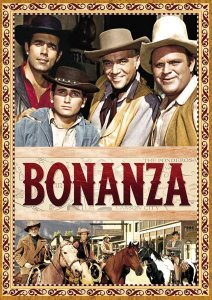 Kaitlyn Dunnett/Kathy Lynn Emerson here, today thinking about how my TV viewing has changed over the years. As a small child in the 1950s, I remember watching The Howdy Doody Show, and Mary Martin’s Peter Pan, and that my mom was a fan of Raymond Burr’s Perry Mason and the variety shows hosted by Red Skelton and Mel Tormé, among others. Rocky Jones, Space Ranger and Sky King were favorites somewhere toward the end of that period. As I hit the teenage years, I was a big fan of westerns like Bonanza (with a huge crush on Little Joe) and in high school a lot of us tuned in to Soupy Sales when we got home in the afternoon.
Kaitlyn Dunnett/Kathy Lynn Emerson here, today thinking about how my TV viewing has changed over the years. As a small child in the 1950s, I remember watching The Howdy Doody Show, and Mary Martin’s Peter Pan, and that my mom was a fan of Raymond Burr’s Perry Mason and the variety shows hosted by Red Skelton and Mel Tormé, among others. Rocky Jones, Space Ranger and Sky King were favorites somewhere toward the end of that period. As I hit the teenage years, I was a big fan of westerns like Bonanza (with a huge crush on Little Joe) and in high school a lot of us tuned in to Soupy Sales when we got home in the afternoon.
Once in college, my viewing habits changed simply because the only televisions were in community settings. We gathered in the dorm or in the student center to watch Star Trek (yes, the original, first-run episodes). After college and marriage, my husband was in the navy and I was in grad school and then teaching at community college and we were both active in community theater. That didn’t leave a lot of time to watch TV. Back in Maine in our mid-twenties, sitcoms made up a lot of our viewing, along with science fiction like Babylon 5 and Star Trek: Deep Space Nine.
We also watched the news, local and national, usually on NBC, although on Sunday mornings, we turned to CBS to watch Sunday Morning, first with Charles Kuralt and then Charles Osgood. That’s still a habit, only Jane Pauley now has the anchor spot. But the nightly news? Not so much. We used to turn on WCSH6 at 5 and watch three editions of local news followed by a half hour of national news from NBC. Now we turn on the TV at 5:30, watch through the local weather report, and then turn it off. My husband gets his news from local newspapers with online subscriptions. I get mine from sources I trust online at Substack and other locations. Both of us want to be informed but feel it’s best just now, for our mental health, to limit exposure to depressing/annoying/infuriating news stories.
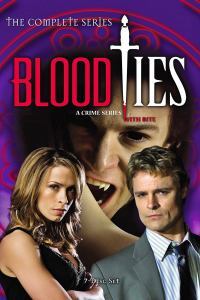 I went through a paranormal fangirl period during the years when Buffy, the Vampire Slayer was on, also watching The Dresden Files and Blood Ties with great enthusiasm. I would have watched the adaptation of Charlaine Harris’s Sookie Stackhouse novels, True Blood, but it was on HBO and I was too cheap to subscribe. There isn’t much that appeals to me in that genre or in science fiction anymore, and what there is tends to be either too violent or too silly. I had hopes for Resident Alien but I gave up after season two.
I went through a paranormal fangirl period during the years when Buffy, the Vampire Slayer was on, also watching The Dresden Files and Blood Ties with great enthusiasm. I would have watched the adaptation of Charlaine Harris’s Sookie Stackhouse novels, True Blood, but it was on HBO and I was too cheap to subscribe. There isn’t much that appeals to me in that genre or in science fiction anymore, and what there is tends to be either too violent or too silly. I had hopes for Resident Alien but I gave up after season two.
What I enjoy in the comedy genre has changed over the years. In my humble opinion, good sitcoms, like those featuring Mary Tyler Moore, Bob Newhart, and Bill Cosby, are in short supply. The “com” part is definitely lacking. This past season I only watched two, Georgie and Mandy’s First Marriage (the sequel to Young Sheldon) and the last season of The Conners. In drama, my only picks were Elsbeth and Kathy Bates’s Matlock. Frankly, nothing else appealed.
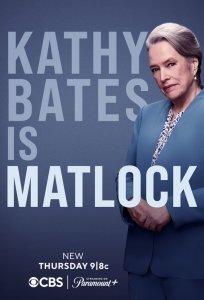 Mostly, I stream things on my iPad, using headphones while the husband watches NESN (Red Sox games), PBS (Cook’s Country, America’s Test Kitchen, This Old House, Antiques Roadshow, Finding Your Roots), Magnolia Network (Maine Cabin Masters) or the Weather Channel (Highway Through Hell and its clones). Sometimes I watch with him, but I prefer something with a plot.
Mostly, I stream things on my iPad, using headphones while the husband watches NESN (Red Sox games), PBS (Cook’s Country, America’s Test Kitchen, This Old House, Antiques Roadshow, Finding Your Roots), Magnolia Network (Maine Cabin Masters) or the Weather Channel (Highway Through Hell and its clones). Sometimes I watch with him, but I prefer something with a plot.
In addition to streaming movies on Prime or TCM, I’ve been working my way through all ten seasons of Agatha Christie’s Poirot on BritBox. Over on Paramount+ I’m doing the same with the sitcom Hot in Cleveland. Unfortunately, that channel adds a ton of commercials to every episode but I’ve mastered the art of reading a few more pages of whatever physical novel I have on hand during those. Also, in an exception to my habit of picking escapist entertainment, I recently watched season one of BritBox’s Outrageous about the Mitford sisters in the 1930s. It was hard seeing scary similarities to present day politics but I got hooked on the story anyway. I’m hoping there will be a season two.
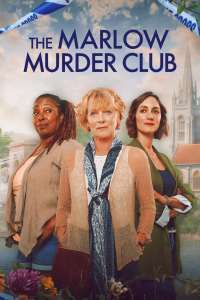 In other future viewing, I’m looking forward to watching several new things. The Marlow Murder Club‘s second season will debut on PBS later this month. There will probably be new seasons of Father Brown and Death in Paradise on BritBox, but alas, no more of Vera. And since sitting in a crowded movie theater no longer holds any appeal for me, I’m planning to stream three about-to-be-released films, the new Superman, the next Jurassic World, and the final Downton Abbey movie—but only after the rental price drops to a reasonable level.
In other future viewing, I’m looking forward to watching several new things. The Marlow Murder Club‘s second season will debut on PBS later this month. There will probably be new seasons of Father Brown and Death in Paradise on BritBox, but alas, no more of Vera. And since sitting in a crowded movie theater no longer holds any appeal for me, I’m planning to stream three about-to-be-released films, the new Superman, the next Jurassic World, and the final Downton Abbey movie—but only after the rental price drops to a reasonable level.
What about you, dear readers? Have your viewing habits changed over the years? Share, please.

Kathy Lynn Emerson/Kaitlyn Dunnett has had sixty-four books traditionally published and has self published others. She won the Agatha Award and was an Anthony and Macavity finalist for best mystery nonfiction of 2008 for How to Write Killer Historical Mysteries and was an Agatha Award finalist in 2015 in the best mystery short story category. In 2023 she won the Lea Wait Award for “excellence and achievement” from the Maine Writers and Publishers Alliance. She was the Malice Domestic Guest of Honor in 2014. She is currently working on creating new editions of her backlist titles. Her website is www.KathyLynnEmerson.com.
Lea Wait's Blog
- Lea Wait's profile
- 508 followers



